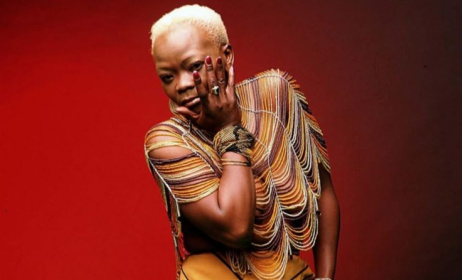Interview: Spotify sub-Saharan Africa managing director Jocelyne Muhutu-Remy
Following Spotify’s recent announcement of a multiyear investment in Vibrate Space, a community recording studio and music business programme operated by Surf Ghana in Accra, the digital service provider’s (DSP’s) managing director for sub-Saharan Africa, Jocelyne Muhutu-Remy, has opened up about Spotify’s commitment to enabling the creator economy while growing the streaming company’s foothold in the African music market.
 Jocelyne Muhutu-Remy.
Jocelyne Muhutu-Remy.
Spotify’s Creator Equity Fund will finance the latest investment, which will involve expanding Vibrate Space. The model being implemented will combine sports, youth rehabilitation and music, and include accommodation and an artist-in-residence programme for emerging creators. The funding will also support artist development in the form of a youth hostel, a three-month instrument learning programme and an artist-organised festival at the end of the year.
US Vice-President Kamala Harris even visited Vibrate Space during the first stop of her recent Africa tour. Harris wanted to see local activities related to the youth and music industry, and was welcomed at Vibrate Space where she met and spoke to local artists.
“That kind of spotlight can only be good, especially for those artists who were present to interact with her,” Muhutu-Remy tells Music In Africa. “Look at someone like Baaba Jay. For this up-and-coming Afro-indie artist to have a full five minutes with Kamala Harris, it’s just a dream, and hopefully it’ll help boost her career and that of others too.”
“By investing in Surf Ghana, what we are allowing is for artist education because we see that there is a huge gap,” she says, adding that artists often only focus on the art without thinking about the business elements of their craft. “They’re sometimes not careful with choosing the right managers or whom they sign with. They don’t think of various ways to make revenue. Streaming is one way but there are others like touring, which is very important. So, artist education is crucial. Another thing is where to record when you don’t have enough money. You need studio space where you can record and rerecord. At Vibrate, they have that. All you need to do is register to get access. So these are the things that this investment is helping solve.”
Muhutu-Remy says Ghana’s reputation as a cultural hub with a thriving music scene makes it an ideal region for investment. And Spotify plans to expand to other African countries, each with its unique needs such as a heightened focus on emerging and alternative genres. To stay ahead of emerging trends, Spotify hires music experts who are passionate about discovering upcoming artists to help Spotify serve them.
Muhutu-Remy attributes Spotify’s success in emerging markets like Africa to a number of factors. Firstly, the DSP’s local presence and understanding of local specificities, thanks to experts who are up-to-date with listeners’ tastes and preferences. Next, Spotify’s uniqueness as a product, which boasts a catalogue of more than 80 million songs as well as personalised music discovery features that identify users’ moods and tastes, making the platform accessible and relatable.
The music executive also touches on Spotify’s expansion plans on the continent, emphasising that without more users, artists’ livelihoods could be affected. The company’s vision revolves around making music available to a billion people around the globe so that a million artists can live off their art. Spotify’s efforts to address structural challenges in the regions that the company operates in aligns with this goal. It recognises that the success of the music industry relies on various interdependent factors. For instance, if copyright laws are inadequate and if collective management organisations are absent, artists cannot earn money, reasons for which Spotify intervenes in these areas. Similarly, without support for up-and-coming artists, the industry cannot thrive, which is why the company has become involved in all aspects of the music ecosystem.
About 70% of Spotify’s revenue is distributed to rightsholders. Since its inception, the platform has paid out more than $40bn to the artist community and claims to play a significant role in making legal music accessible to people worldwide. Muhutu-Remy worries that people may not realise that using unauthorised sources to consume music could have a detrimental effect on the artists they support. By subscribing or using legal platforms, however, listeners are actually supporting their favourite artists. This realisation, she notes, is gaining steam. Additionally, Spotify believes in its current revenue distribution model, which has been effective thus far despite talks of change within the industry.
With operations in most countries across Africa, the company’s new focus is on deepening its presence by offering its freemium, ad-supported option and a subscription service with competitive payment methods. To address challenges around subscription fees and data, Spotify is also deepening its relationships with telcos and finding alternative payment methods such as M-PESA in Kenya, as well as making deals around affordable data plans and lightening the Spotify app as much as possible.
Particularly in sub-Saharan Africa, the emergence of DSPs has led to the availability of data analytics for artists to track their success. Muhutu-Remy says the Spotify for Artists platform also provides educational programmes for artists to improve their understanding of data.
“It is important for professional musicians to be well-informed about their fan base, as it can help them succeed in touring. The tool enables artists to be strategic and intentional about their work. They can identify unexpected audiences and learn which tracks perform better than others. Being knowledgeable about data is crucial for artists, and Spotify for Artists offers an effective platform for them to do so.”
I bring up Wrapped, Spotify’s end-of-year round-up for 2022, which highlighted the top performing artists and songs, and my deduction that independent artists are gaining popularity via the platform. Muhutu-Remy explains that playlisting plays a big role in levelling the playing field for artists, citing Ria Boss from Ghana as an example of an artist who would have gone undiscovered had it not been for her playlist inclusions on Spotify.
What do popular playlists like Top Hits and African Heat say about music consumers from the continent? Muhutu-Remy says Top Hits is popular with African listeners because it features the biggest tracks from around the world, while African Heat has seen a significant growth in local consumption, with a 200% increase in Ghana in the past year alone.
“Ghanaians are listening to Ghanaian music more and more,” she says. “That’s something we are learning about our listeners. Honestly, I find this very exciting. It just shows that the local music scene is growing enough and producing quality outputs that people are keen to discover.”
Muhutu-Remy also mentions other interesting playlists, such as Hot Hits Philippines and K-Pop ON! which demonstrate a growing interest in popular genres from other parts of the world, proving that playlisting has helped bring the world and Africa together, leading to better discovery of local markets.
Sharing insights into the habits of Gen Zs in Africa, Muhutu-Remy says young people aged 13 to 25 are equally open to Western music and culture as they are to cultures from other parts of the Global South, such as Asia, India and Latin America. This is a departure from previous generations where the choice was either to be very local or to look to the West. “Nowadays, there is renewed interest in local music, driven by increased creativity,” she says.
On Spotify’s approach to cultural preservation, Muhutu-Remy says the platform is designed to represent everything that people care about, including emerging arts and cultural heritage. Thus, there are playlists dedicated to nostalgia, and Spotify is working with different rightholders to digitise analogue releases to achieve catalogue completion.
What about the growing phenomenon of podcasts on the continent, and how African creatives in this space can better harness the opportunities available? To Muhutu-Remy, podcasts have enabled self-expression in unexpected ways and have created a platform for discussing niche interests in the audio-only format.
“That’s something that personally I’m finding very exciting, because with music it’s a little more complex because you need a distributor and you need to put up the metadata. For example, if you wrote a song, you probably didn’t write it on your own, you did it with a writer. All of those people need to be in the system. For podcasts, it’s much simpler. The possibilities for self-expression across the world are greater with podcasts because radio, for example, can be limiting, as a frequency can only reach a certain area. With podcasts, you can publish now and someone in Japan can listen to it in the next hour. So the possibilities in this space are immense.”
On the topic of equal representation, she cites Spotify programmes such as RADAR and Fresh Finds, which offer support and exposure to undiscovered artists. Other platforms are EQUAL for female artists and GLOVE for the LGBT community, and Muhutu-Remy notes that her outfit prioritises gender and race representation in hiring processes. She also acknowledges the gender gap in the music industry, the challenges faced by artists who lack opportunities despite their drive and talent, and the need for deliberate action to address them.






























Comments
Log in or register to post comments